- Home
- Neil Gaiman
InterWorld Page 7
InterWorld Read online
Page 7
Looking down at my body, I could see the silver covering, but I could also see inside it. It was a little like the heads-up displays fighter pilots use in their cockpits. I could see the golden bottle and what looked like a gun of sorts and several objects I didn’t recognize. They seemed to be in pockets of some kind. And I could see my own body.
I was warm now, except my left shoulder, where the suit had been damaged by Lady Indigo’s spell, and the places where it had been punctured.
Seen through the mirror mask, the amoeba thing looked even stranger. It was like looking at something huge through binoculars held the wrong way. It was only the size of a cat—I knew that. But somehow I could not shake the idea that it was truly the size of a skyscraper, only it was ten miles away. Does that make any sense?
“Do you have a name?” I asked it.
It glowed a hundred colors. I took that as a yes. Trouble is, I don’t speak colors. “I’m going to call you Hue,” I told him. “It’s a joke. Not a funny one, the other kind.” It glowed gold, which I took as it not minding.
I bent down, picked Jay up and put him over my shoulders. I could still feel the bulk of him, but it felt like the suit was taking most of the weight. It felt like he weighed about thirty pounds.
And then I thought:
{IW}:=Ω/∞
—and I made for the base, carrying Jay’s body over my shoulders like a Sioux hunter carrying a deer back to camp.
Hue bobbed along in the air beside me for a little way, until I came to a path that I could feel would lead me into the Earth with the InterWorld base in it.
I wish I could explain it better than that. I could feel it there, in the same way you can feel with your tongue a place in your tooth where a filling has fallen out. I could feel it.
It was time to Walk. And I did.
The last thing I saw of that place was Hue, bobbing maybe a bit sadly in the air behind me. And then the scene was replaced by . . .
Nothing . . .
A riverbank . . .
A glimpse of a city . . .
A thousand eyes, each closing and opening independently, each looking for me . . .
A grassy plain and, in the distance, purplish mountains.
And suddenly I was there, wherever “there” was. I knew it. I could feel it in my head.
{IW}:=Ω/∞
wasn’t going to take me any farther.
But there wasn’t anything around. I was in the middle of a deserted pampas, all on my own. I put Jay’s body down on the grassy ground. I figured that either the people from Jay’s base—from InterWorld, whatever that was—would come and find me or they wouldn’t, and suddenly and honestly I didn’t care one way or the other.
I put my finger to the soft place under my chin and felt the suit retract from my face, leaving it naked to the warm air. And then, all alone, a million million miles from everywhere, I started to cry—for Jay, and for my parents, and for Jenny and the squid, and for Rowena and Ted Russell and Mr. Dimas and all of us.
But mostly I cried for me.
I cried and sobbed until there wasn’t anything left inside me to cry with, and then I sat there, with the tears drying on my face, feeling empty and wrung out until the sun went down, and a city in a glass dome came over the pampas, levitating silently about six feet above the ground. It stopped fifty feet away from Jay and me, and a party of people who looked kind of like me came over and picked us up and took us away.
PART II
CHAPTER NINE
I WAS HOLDING ONTO the side of the cliff face for dear life. I was wearing a one-piece gray coverall and a pair of climbing boots. There was a rope clipped to the belt around my waist, attached to the climber maybe twenty feet above me. She disliked me cordially. Which complicated matters somewhat, seeing that a hundred feet above her was freedom and warmth and solid food and a way back to base.
The way I felt, a hundred feet might as well have been a hundred miles. I was hungry and cold and my fingers hurt, and so did my toes. Not to mention everything in between.
I had a neural-net band around my head, coded to stop me Walking out of this if an opportunity presented. Which I might have done. Believe me, it was tempting, especially when the sleet started: a wet, freezing rain with snow mixed in, which soaked me to the skin and then froze me. Perfect. I started shivering so hard I could barely hold on.
There was a cough just behind me. I turned, very carefully.
It was Jai. He was one of the ones who looked a lot like me, except his skin was walnut brown. He wore a one-piece white robe and was sitting cross-legged. Actually he was floating cross-legged, about a hundred and fifty feet above the ground.
“I came to inquire how you were faring,” he told me in his gentle accent. “This rain makes the climb quite problematic. Should you desire to terminate the ascent at this juncture, it would not be perceived as something lacking in you.”
My teeth were rattling like dice in a cup; I could barely hear him. “What?”
“Do you want to stop now?”
Like I said, it was tempting. But I had more than enough problems without being labeled a coward as well. “I’ll keep going,” I told him, “if it kills me.”
“That,” he said disapprovingly, “is not an option.” Jai was something of a jerk, but at least he acknowledged that I existed. He floated slowly upward to the camp at the top of the hill.
I started climbing again. I reached a deep crack in the rock, which I chimneyed up, removing most of the skin from my arms and back in the process. After what seemed only a small eternity I reached a ledge about thirty feet above the place I had been, and I saw the girl I was climbing with. She was huddled on one side of the shelf, out of the direct reach of the sleet. She couldn’t have been comfortable, though, a fact which I tried not to take too much pleasure in. She barely spared me a glance when I got there. She was staring out into the sky.
“Got any plans for reaching the top?” I asked her, eyeing the rock face above us warily.
“The list of people I don’t talk to is pretty short,” she told me. “Actually, you’re about it.” She went back to looking at the featureless storm.
Well, okay . . . I thumbed open the thermopack hanging from my belt and poured out a cupful of steaming hot reconstituted buffalo soup. I didn’t offer her any; first, because she had her own packs hanging from her own belt, just like mine, and second, because to hell with her.
I sipped the soup slowly, so as not to burn my mouth—that stuff got hot fast—and looked at Jo, particularly at the two things that made her so different from me.
“Stop staring.”
“I’m sorry,” I said. “It’s just, where I come from, nobody has wings.”
She looked at me as if I were something she’d just found on the sole of her shoe. Jo’s from one of the magic worlds. The wings—huge, white, feathered wings, like angels have in paintings—don’t keep her aloft when she flies, although she can use them to glide and to steer herself. What keeps her up when she flies, the Old Man once said, is the conviction that she can fly. That and the fact that on her world there truly is magic in the air. I’d often wanted to ask her if her people descended from winged apes, like Jakon’s folk came from a wolfish sort of world, or if, long ago in her world, some sorcerer grafted swan wings onto the back of a baby and they just took it from there. But, since she viewed me with about the same degree of affection she might an Ebola virus, it wasn’t likely I’d ever find out.
I’d been at the camp ten days, and it already seemed like a lifetime. And not a happy lifetime. Rather, it was one of those lifetimes that convinces you you must have been Genghis Khan in a previous incarnation, and you were still paying off the karmic debt.
Ten days before being on the cliff in the rain, I’d woken up on some kind of canvas camp bed in a white room that smelled like disinfectant with the sound of band music in the background. It was a mournful sort of music, stirring yet sad.
It was a funeral march.
; The music stopped. I got out of the bed and walked, a little unsteadily, over to the window and looked out.
There were about five hundred people standing on a large parade ground. Very different people. They were standing in lines, arrayed around a box. On the box was a body covered with a black flag.
I knew who the body belonged to.
And I knew whose life he had died saving.
Up on a dais was a man who looked kind of like I might, if I lived to middle age. He was just finishing saying good things about Jay, I knew, although I could barely hear his words.
And then the people started to shout. They shouted in five hundred different voices, a wordless shout that was a wail of loss but also a cheer of victory. It was shouted and screamed and wailed and torn from five hundred throats.
And the box with the coffin in it flickered and shimmered and shifted. And then it flared and was completely gone.
The band started to play again, the mournful march, but this time it was more upbeat. Life goes on was what it said.
I went back and sat on the canvas bed. I was in some kind of hospital. That was obvious. And I was in the bubble-dome base. And I had seen Jay’s funeral.
There was a knock on the door.
“Come in,” I said.
It was the older man, the one who’d given the speech. “Hello, Joey,” he said. His uniform was crisp and clean. “Welcome to Base Town.” One of his eyes was brown, just like mine. The other was artificial: it was like a cluster of colored LEDs where his eye ought to be.
“You’re me, too,” I said.
He inclined his head. It might have been a nod of agreement. “Joe Harker. Around here they call me the Old Man, mostly behind my back. I run this place.”
“I’m sorry about Jay,” I said. “I brought back his body.”
“That was well done,” he said. “And you brought back his encounter suit, which was even more important. We only have a dozen of them. They don’t make them anymore. The world that manufactured them is . . . gone now.” He paused.
I figured I had to say something, so I said, “Gone? A whole world?”
“Worlds are cheap, Joey. It sounds horrible to say, but most horrible things have a measure of truth in them. The Binary and HEX consider worlds very cheap indeed, and life cheaper still. . . . But let’s get back to you. You did well, bringing back the body. It gave us something to say good-bye to. And the suit contained his last messages.” He paused again. “Do you remember when we brought you in? You seemed more or less delirious. You kept calling for me.”
“I did?”
“You did. You told us that you’d got Jay killed, saving you. All about the MDLF and the tyrannosaur snake. That you were stupid and got him into trouble.”
I looked down. “Yeah.”
He flipped open a notebook, checked it. “‘Jay said to say sorry to the Old Man, to tell him he was sorry he had made him short one operative. He said his replacement gets his highest recommendation.’”
“Did I tell you that?”
“Yes.” He looked back at his notebook. Then he said in a puzzled tone, “What’s FrostNight?”
“FrostNight? I don’t know. It was something that Jay said I should tell you. You can’t lose a single operative. FrostNight is coming.”
“He didn’t say anything else about it?”
I shook my head.
The Old Man scared me. I mean, yes, he was me, but he was a me who had seen so much. I wondered how he had lost his eye. Then I wondered if I really wanted to know.
“Can you send me home?” I asked.
He nodded without speaking. Then he said, “We can. Yes. It’d be an effort. And it’d mean we’d failed. We’d need to wipe your memories, to remove all information about this place; and we’d need to destroy all your world-Walking abilities. But, yes, we could do it. They might wonder where you’d got to, but time doesn’t flow at a constant rate across the worlds; you’ve probably not been gone more than five minutes, so far. . . .” He must have seen the hope on my face. “But would you desert us like that?”
“Mister, no offense, but I don’t even know you. What makes you think I want to join your organization?”
“Well, you come with the highest recommendation. Jay said so. Like he said, we can’t afford to lose a single operative.”
“I—I’m the replacement he was talking about?”
“I’m afraid so.”
“But I got him killed.”
“All the more reason to make it up here. Losing Jay was a tragedy. Losing both of you would be a disaster.”
“I see. . . .” I thought about home—my real home, not these countless different shadows of it. “So you could send me back?”
“Yes. If you flunk out of here, we may have to.”
If I closed my eyes, I could still see Jay, looking up at me from the red earth before he died. I sighed. “I’m in,” I said. “Not for you. For Jay.”
He held out his hand. I reached out my hand to shake it, but instead he enveloped my hand in his huge, hard hand and stared into my eyes. “Repeat after me,” he said, “I, Joseph Harker . . .”
“Uh—‘I, Joseph Harker . . .’”
“Understanding that there must be balance in all things, hereby declare that I shall do all in my power to defend and protect the Altiverse from those who would harm it or bend it to their will. That I will do everything I can to support and stand for InterWorld and the values it embodies.”
I repeated it, as best I could. He helped me when I stumbled.
“Good,” he said. “I hope that Jay’s faith in you is justified. You’ll need to pick up your gear from the quartermaster on duty. The stores are in that square building across the parade ground. It’s eleven hundred hours now—enough time to get settled in your barracks and unpacked by eleven forty-five. Lunch is at twelve hundred hours. Twelve forty you start basic training.”
He got up and prepared to go out. I had one question left to ask him.
“Sir? Do you blame me for Jay’s death?”
His LED eye glittered a cold blue. “Hmm? Yes, of course I do. And so do five hundred other people on this base. You have a hell of a lot to make up here, boy.” And he walked out.
It was like being a new kid in a school you hated. Only worse. It was like being a new kid in a school you hated that was run by the army on vaguely sadistic principles, where everyone was from a different country and they had just one thing in common.
They all hated you.
It could have been worse. No one spat in my food, no one dragged me off behind the barracks to beat the hell out of me, no one put my head into the toilet and flushed it. But no one spoke to me, unless they had to. They wouldn’t help me. If I was going the wrong way to class, no one would mention it; and when they saw me jogging around the parade ground, sweating and breathless, because I’d turned up five minutes late . . . well, that was the only time I’d see my fellow recruits smile when they looked in my direction.
If I was accidentally knocked over in rope climbing; if I got the weakest gravity repulsor disk in disk riding; if I got the oldest, grubbiest, most underpowered wand in Magic 101; if I ate at a table on my own, in the middle of a crowded mess hall . . . well, that was what happened.
I didn’t mind.
No, more than that: I was glad. They weren’t punishing me any more than I felt I ought to be punished. Jay had saved my life; he’d rescued me from that ship in the middle of the Nowhere-at-All; he’d saved me from my own stupidity more than once. And I’d paid him back by getting him killed.
So everybody got in line to hate me, and I was right at the front of the line.
A spray of sleet hit me in the face, and I clipped the cup back to my belt and I turned back to the rock face. “Okay,” I said. “Time to head back up.”
Jo said nothing. She flapped her wings to shake off the icy water and turned back to the rock face. She climbed, and, after a few minutes, so did I.
I was shivering. It was eas
ier now, though: Jo seemed to have an instinct for the handholds and footholds, and I followed her. Which went fine until the rain grew harder.
I looked up. The rock that Jo was standing on was crumbling beneath her foot.
“Hey!” I yelled, frantically signaling her to move.
But she ignored me. Then the rock gave way, and Jo slipped back down in a shower of pebbles. She fell directly onto me, knocking both of us down the cliff face.
It was a long way down, and we were tumbling fast together.
I grabbed her by the waist and pushed away from the cliff with my legs. She got the idea at once and flapped hard with her wings. Maybe she couldn’t keep both of us up for long, but we didn’t need to be up for long.
She landed back on the ledge where I’d eaten my soup.
“I tried to tell you,” I told her.
“Yeah,” she said. “I knew you were trying to get my attention. I just wasn’t going to look at you.”
I stood in the rain and shivered. “How did you know Jay?” I asked her.
“The same way all of us did. One day we started Walking. He came and got us and brought us back here. Mostly he got us out of trouble on the way.”
“Well, that’s how he found me. And he saved my life on the way, three or four times. And he gave up his own life getting me here. But I don’t think he would have treated me like this. And I don’t think he would have let me treat myself like this.”
There was a pause. Then she looked me straight in the eyes, with brown eyes that were like looking into a mirror. “You’re right. I don’t think he would either. I’ll spread the word.”
We climbed back to the top of the cliff in silence then, but it was an okay silence.
After that, things got better. Not much better. And not all the way. But they improved.
CHAPTER TEN
AND I’D THOUGHT MR. Dimas’s tests were hard.
Exams on InterWorld would make a Mensa chapter gulp with disbelief. It would have smoke coming out of the ears of our best brain trusts. How do you answer a question like: “Is the improbability factor of a time-reversed world solipsistic or phenomenological?” Or: “Describe six uses for the anti-element pandemonium.” Or how about: “Explicate the gnosis available from Qlippothic Beings of the Seventh Order.”

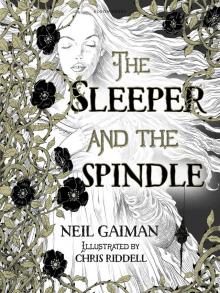 The Sleeper and the Spindle
The Sleeper and the Spindle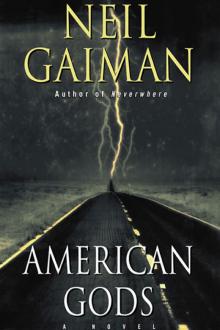 American Gods
American Gods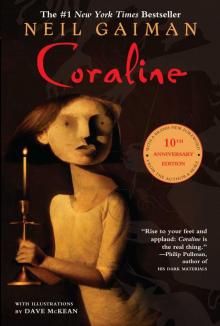 Coraline
Coraline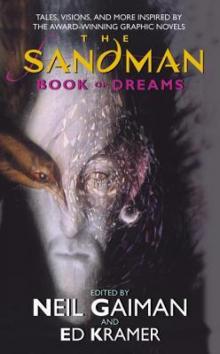 The Sandman: Book of Dreams
The Sandman: Book of Dreams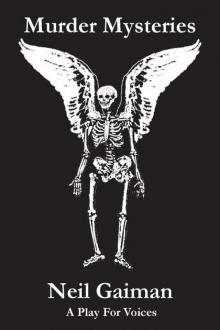 Murder Mysteries
Murder Mysteries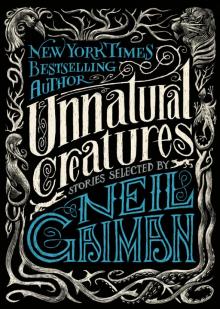 Unnatural Creatures
Unnatural Creatures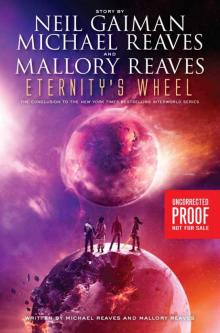 Eternity's Wheel
Eternity's Wheel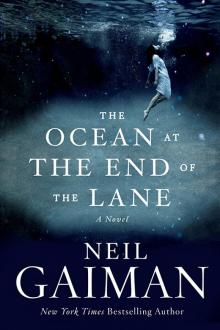 The Ocean at the End of the Lane
The Ocean at the End of the Lane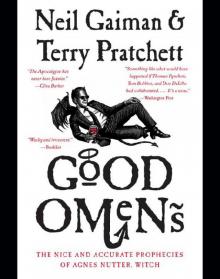 Good Omens
Good Omens Stardust
Stardust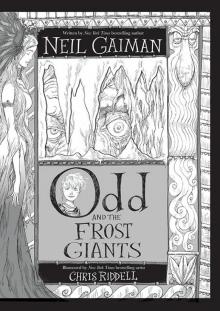 Odd and the Frost Giants
Odd and the Frost Giants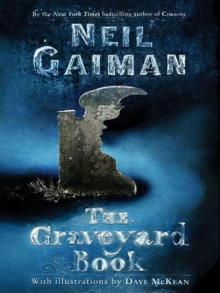 The Graveyard Book
The Graveyard Book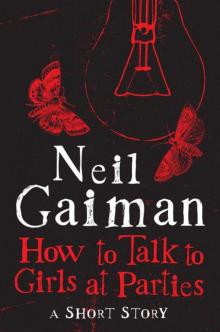 How to Talk to Girls at Parties
How to Talk to Girls at Parties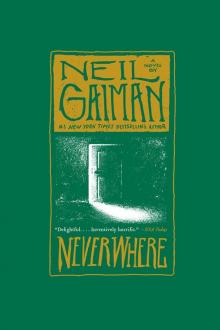 Neverwhere
Neverwhere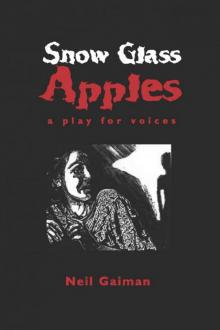 Snow, Glass, Apples
Snow, Glass, Apples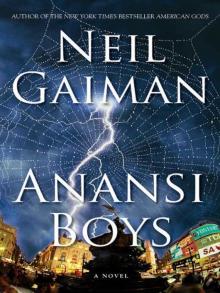 Anansi Boys
Anansi Boys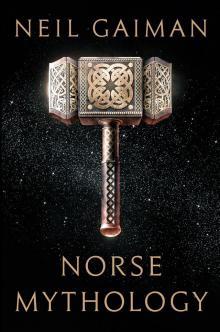 Norse Mythology
Norse Mythology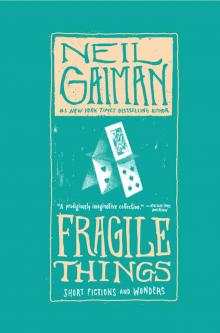 Fragile Things: Short Fictions and Wonders
Fragile Things: Short Fictions and Wonders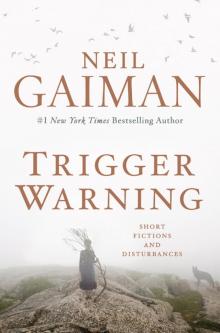 Trigger Warning: Short Fictions and Disturbances
Trigger Warning: Short Fictions and Disturbances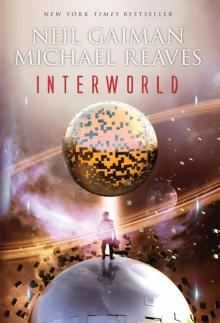 InterWorld
InterWorld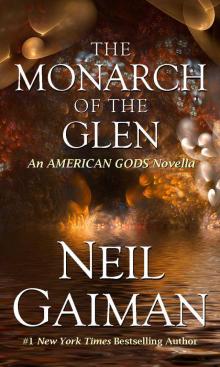 The Monarch of the Glen
The Monarch of the Glen The Neil Gaiman Reader
The Neil Gaiman Reader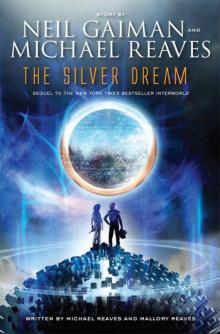 The Silver Dream
The Silver Dream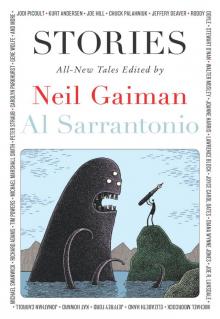 Stories
Stories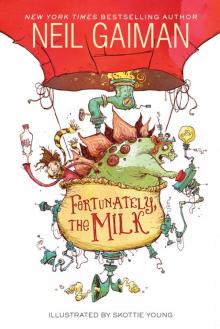 Fortunately, the Milk
Fortunately, the Milk Art Matters
Art Matters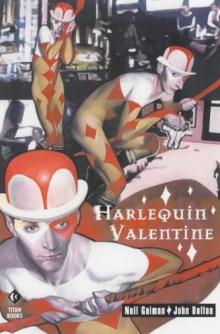 Harlequin Valentine
Harlequin Valentine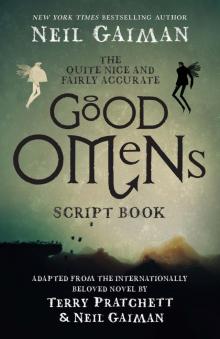 The Quite Nice and Fairly Accurate Good Omens Script Book
The Quite Nice and Fairly Accurate Good Omens Script Book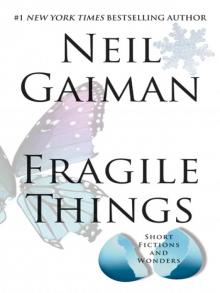 Fragile Things
Fragile Things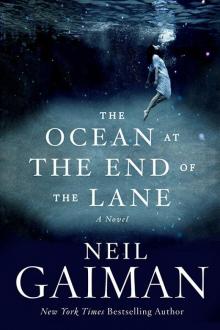 The Ocean at the End of the Lane: A Novel
The Ocean at the End of the Lane: A Novel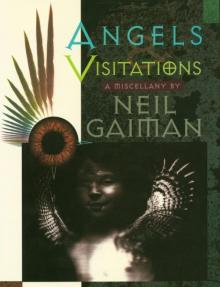 Angels and Visitations
Angels and Visitations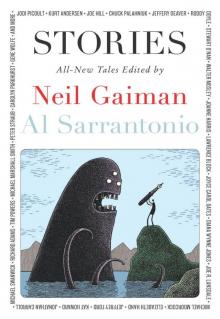 Stories: All-New Tales ngss-1
Stories: All-New Tales ngss-1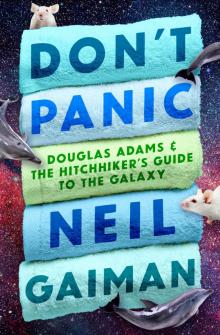 Don't Panic
Don't Panic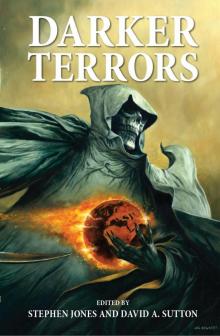 Darker Terrors
Darker Terrors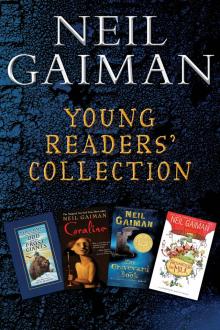 Neil Gaiman Young Readers' Collection
Neil Gaiman Young Readers' Collection A Study In Emerald
A Study In Emerald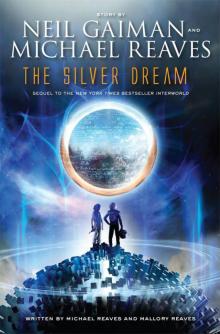 The Silver Dream: An InterWorld Novel
The Silver Dream: An InterWorld Novel Feeders and Eaters
Feeders and Eaters Psychos
Psychos The View from the Cheap Seats
The View from the Cheap Seats Trigger Warning
Trigger Warning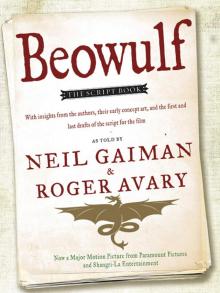 Beowulf
Beowulf Nessun Dove
Nessun Dove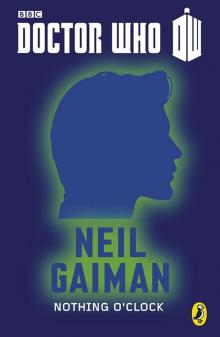 Doctor Who: Nothing O'Clock: Eleventh Doctor: 50th Anniversary
Doctor Who: Nothing O'Clock: Eleventh Doctor: 50th Anniversary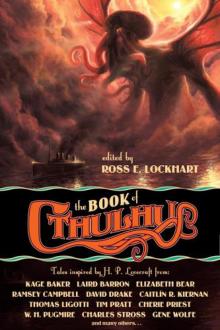 The Book of Cthulhu
The Book of Cthulhu